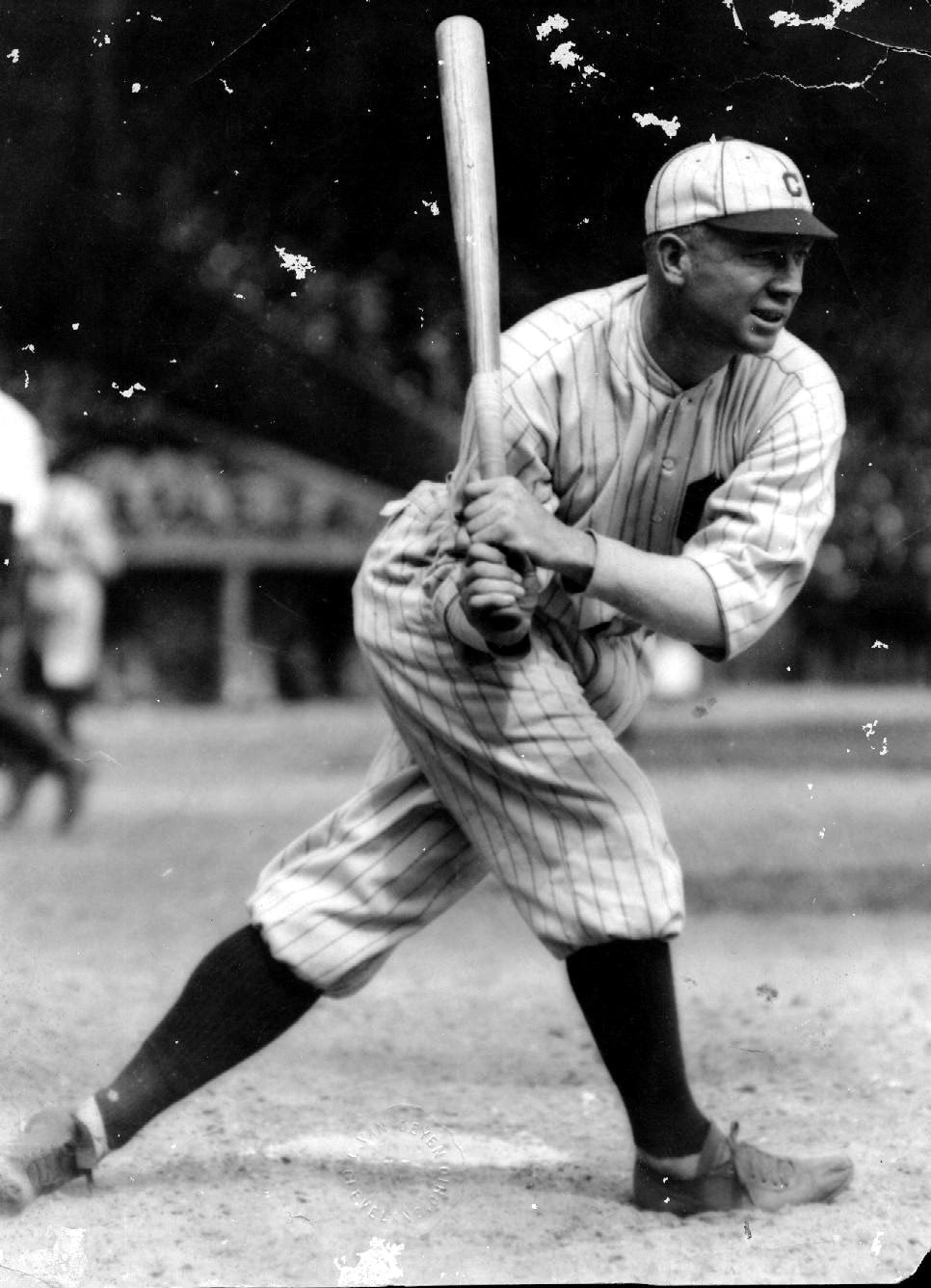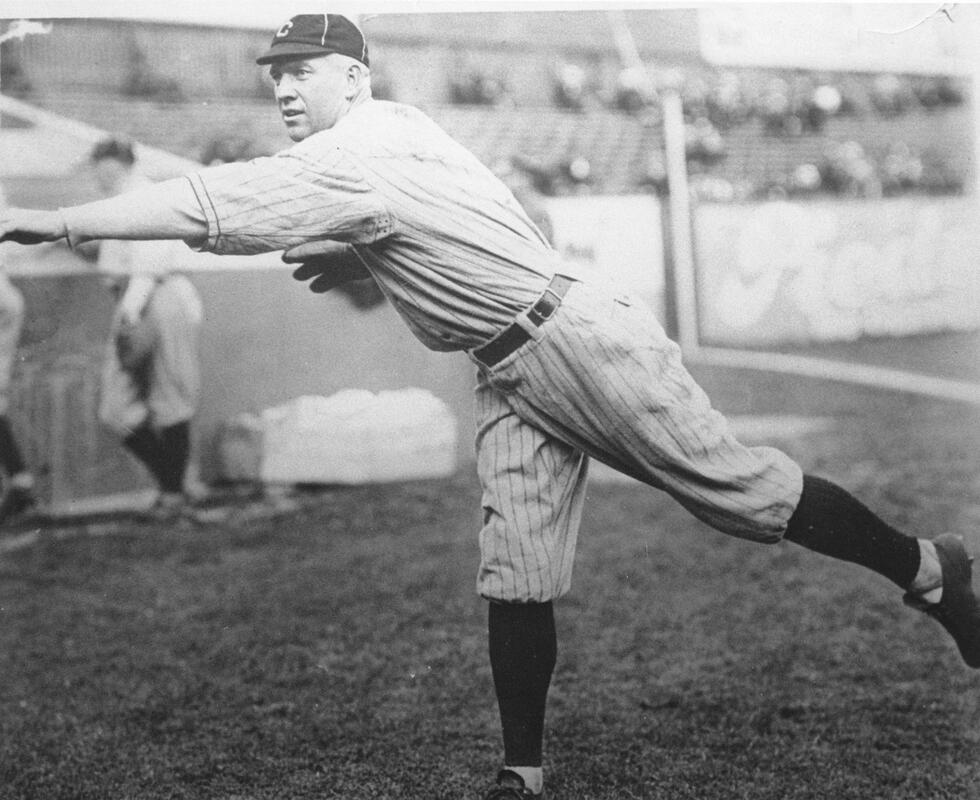|
On January 11, 1951, Tris Speaker became the first member of the Texas Sports Hall of Fame. He had impeccable credentials. Speaker always has been, and always will be, rated as one of the greatest outfielders in the history of baseball. They called him “Spoke” and “The Gray Eagle,” the latter nickname because of his prematurely-gray hair and the fact there were few, if any, better “ballhawks” than he. Speaker wielded a smoking bay, was a fine fielder and was a team leader. His major league career batting average of .334 was fifth on the list of all-time highs in the twentieth century. He got the most doubles in major league history, 793, and he stole 433 bases. His style of fielding was unusual. No one, before or since, played center field so close to the infield. Tris had an uncanny ability to gauge the speed and distance a ball would travel and to be under it, or reaching out and catching it, when it fell. As a result, he caught many balls that would elude other fielders. It might be said that Speaker was a fifth infielder. He threw out 30 or more men in four seasons; twice, he threw out 35. The records show that twice in one month—April, 1918—he achieved unassisted double plays at second. Many times, he would sneak in from center field, take a throw from the catcher and pick off a runner. The all-time outfield, in the mind of many, would be composed of Babe Ruth, Ty Cobb and Tris Speaker. Tris would be replaced by Joe DiMaggio on the team of some “experts,” but Speaker deserves the edge. He played longer – nine more seasons—scored many more run, more hits, more doubles, more triples, more stolen bases. It must be remembered, too, that during half of Speaker’s 22 seasons, he was hitting the “dead” ball. Speaker played 100 or more games in 19 consecutive seasons. His record is dotted with other unusual performances: he set major league marks for the most putouts, 6,706; most assists, 449, and chances attempted 7,195. In 1912, when he hit .338 for the Boston Red Sox, he was named the American League’s Most Valuable Player. All those words are about an outfielder. But Tris Speaker started in baseball as a pitcher. And a poor one, at that. Tris was born in Hubbard, in Hill County, and all his life, he called Hubbard his home. He died of a heart attack in 1959 and was buried in Hubbard’s Fairview cemetery, overlooking his birthplace and the town he loved so well. Speaker was exposed to baseball, like so many other Texas boys of the time, as a member of the “town team,” which played similar teams in that part of the state. When he was 18, he was signed by the Cleburne team of the old Texas League – not because of his pitching ability but because he appeared to be able to hit the ball well and to field expertly. Houston’s scouts liked his looks and purchased him from Cleburne. The Houston club put him in center field, and there he remained for the rest of his brilliant career. Speaker’s major league life began in earnest in 1909, when he started the string of 19 straight seasons in which he played more than 100 games. After his great year of 1912, when he was the league’s MVP, the Red Sox played the New York Giants in the World Series. In the deciding game, with his team behind, 2-1, in the tenth inning, Speaker singled in the tying run and the Sox went on to victory over the great Christy Mathewson. In 1920, Speaker was in another World Series, this time with the Cleveland Indians. He was their manager and what a year he had! He batted .388, socked 50 doubles and 11 triples among 214 hits and drove in 107 runs, in addition to be a smart, aggressive manager. Speaker’s Indians won the World Series, over the Brooklyn Dodgers. Despite his national fame, Speaker never forgot his home town. In the spring following the Indians’ 1920 World Series victory, Speaker brought the team to Hubbard for a weekend visit. He split his squad into two teams and staged a game on the Hubbard diamond, so the home folks could see the big leaguers in action. It was typical of his thoughtfulness. While he went into business in Cleveland after his baseball career, he often visited Hubbard, and it was on one of those visits that he suffered his fatal heart attack. There is a marker to Tris Speaker in Hubbard. It highlights his career, including his selection to the National Baseball Hall of Fame and the Texas Sports Hall of Fame, and it ends with these words: “He always came home to Hubbard. Here, he was a lifetime member of the Volunteer Fire Department.”
Comments are closed.
|
Archives
November 2023
Categories |
Contact1108 S. University Parks Dr.
Waco, Texas 76706 |
© Texas Sports Hall of Fame. 501(c)(3). All rights reserved.



 RSS Feed
RSS Feed
